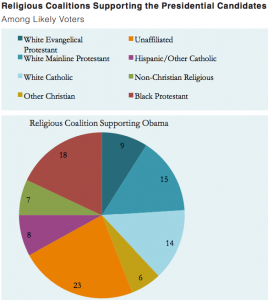We, the religiously unaffiliated, have always “enjoyed” a second-class status, to the point that those who hate us can slanderously accuse us of being responsible for the most horrifying atrocities, and get away with no reaction from liberal churches or the media. Yet, underneath all this, we have been flexing our muscles. President Obama could have never been re-elected without our support.
Of course, we always knew that among groups supporting the president (by religious viewpoint), we were the largest group. Yet this would not, by itself, make us indispensible for his win. Maybe so many of us live on the coasts, where he would win no matter what, that our vote didn’t make that big of a difference?
Guess what: according to an NPR article, it did.
It was the religiously unaffiliated voters, says Iowa-based pollster J Ann Selzer, who gave her one of the election season’s big “aha” moments.
Selzer tells us that in her last Iowa poll before Election Day, data she had compiled for the Des Moines Register showed that Obama was losing to GOP nominee Mitt Romney among both Protestant and Catholic voters. [Emphasis added]
Those voters make up 88 percent of the state’s electorate, yet her final numbers still had Obama leading Romney by 5 percentage points.
“I see this in the data, and give a shout out to Michelle,” Selzer says, referring to her research assistant, Michelle Yeoman.
“How is this possible?” Selzer recalls saying. “I was pretty much awestruck.”
What Selzer found was that though her polling showed Romney leading among Catholics by 14 points and among Protestants by 6 points, Obama was winning the “nones” by a 52-point margin.
Stunning, isn’t it? In Iowa.
— In Ohio, Obama lost the Protestant vote by 3 points and the Catholic vote by 11, but he won the “nones” — 12 percent of the state’s electorate — by 47 points.
— In Virginia, Obama lost Protestants by 9 points and Catholics by 10 points, but won 76 percent of the “nones,” who were 10 percent of the electorate.
— In Florida, Obama lost Protestants by 16 points and Catholics by 5 points, but captured 72 percent of the “nones.” They were 15 percent of the electorate.
Similar results were seen in states including Michigan, New Hampshire and Pennsylvania.
“It was hard to think this was just Iowa,” Selzer said. “And it wasn’t. One of the reasons Barack Obama won was that he had the ‘no religion’ vote by a huge margin.”
The president won swing state after swing state thanks to us.
Nationally, Obama lost the Protestant vote by 15 points, won the Catholic vote by 2 points [Mind you: thanks to Hispanic catholics], and captured 70 percent of the “nones.”
“My question is what is it about having no religion that makes you align so dramatically with the Democratic Party,” Selzer says. “Sociologically, how fascinating is this?”
The article then proceeds to explain why.
“One of the things that really jumped out at us in our analysis was that this is a group that’s quite socially liberal,” says Smith, of Pew’s Forum on Religion & Public Life.
More than three quarters of them say that abortion should be legal in most or all cases, and a similar number support the legalization of same-sex marriage.
The growth in their numbers as part of the electorate is driven in large part by generational change, and generational replacement, Smith says.
“Young people just now entering adulthood are not only significantly more religiously unaffiliated compared with their elders today,” he says, but they are also more religiously unaffiliated than previous generations of young people.
Reproductive rights and equality for gays are the usual suspects. I wouldn’t think those are the only reasons, though. Unaffiliated people, by definition, do not go to church. Hence, when church leaders blame every problem in the world (from droughts to school shootings) on gays, atheists etc, they are less likely to listen to that, and more likely to seek tangible solutions, such as addressing climate change, or gun control. For example, the religiously unaffiliated are more likely to accept the scientific fact of anthropogenic climate change than the general public. These facts are just as likely to make them gravitate toward the Democrats as reproductive and gay rights.
The article gets one thing wrong, though.
He cautions, however, against conflating the “nones” with nonbelievers.
“Those two things are not the same,” Smith says. The “nones’ are certainly less religious than those who say they belong to a religious group, but many are also believers.
“The absence of a connection to an organized religion is not the same as the absence of a religious belief or practice,” he says.
While technically this is true, the fact is that unattached believers make up only a fourth of the unaffiliated, with 3/4 identifying themselves as atheist, agnostic, or secular.
With this article clarifying our crucial and social importance, I think it is time for us to be more assertive demanding strict separation between church and state, and public policies based on science and evidence.

